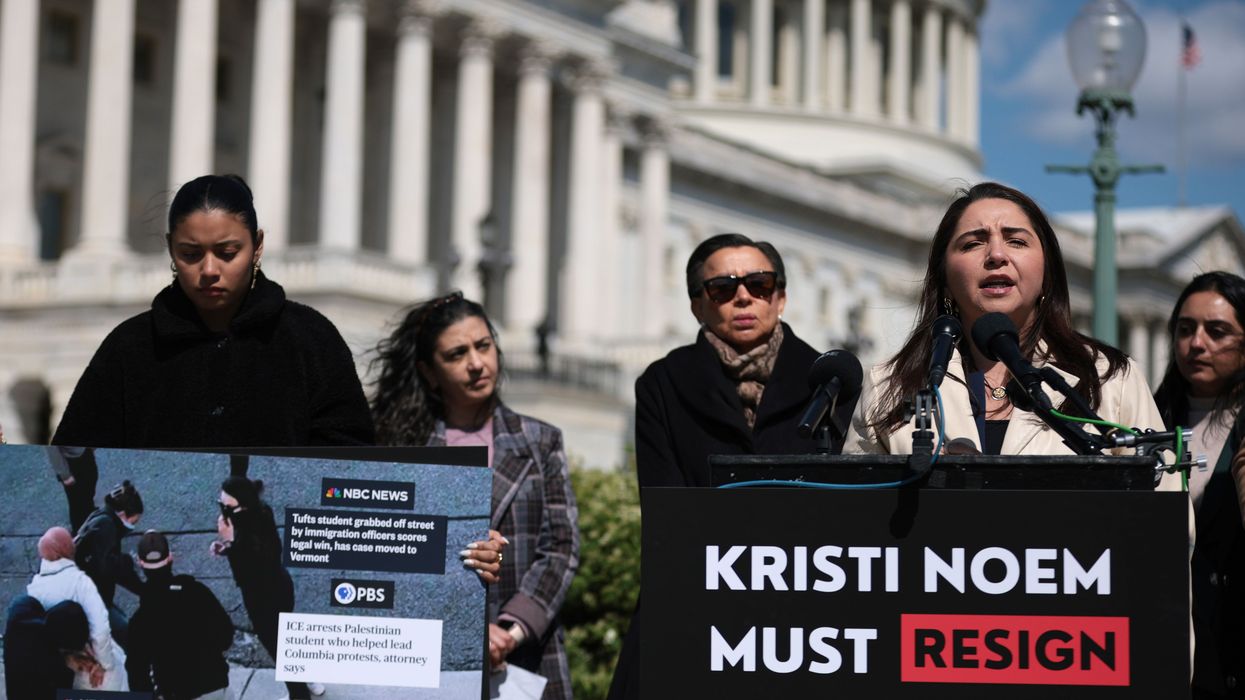April, 06 2010, 05:12pm EDT

For Immediate Release
Contact:
Will Matthews, ACLU, (646) 233-9572 or
(212) 549-2666; media@aclu.org
Wendy Hess, Public Justice Center,
(410) 625-9409, ext. 222; hessw@publicjustice.org
Federal Judge Approves ACLU Settlement Forcing Sweeping Improvements In Conditions At Baltimore City Jail
Detainee Medical And Mental Health Care Will Greatly Improve After History Of Serious Mistreatment
BALTIMORE
A federal judge today gave final approval
to a settlement agreement that paves the way for sweeping improvements
to conditions at the Baltimore City Jail. The approval comes after the
American Civil Liberties Union and the Baltimore-based Public Justice
Center came to an agreement last year with Maryland state officials that
will lead to dramatic improvements in the quality of medical and mental
health care provided to detainees at the facility and effectively
settles major portions of a longstanding class action lawsuit.
"Jail officials have a constitutional
obligation to provide basic levels of medical and mental health care,"
said David Fathi, Director of the ACLU National Prison Project. "This
agreement will help ensure that officials at the Baltimore City Jail
follow the law."
A tentative settlement was reached in
August, but because the case is a class action brought on behalf of all
detainees at the jail, federal law required that the detainees be given
notice of the proposed settlement and an opportunity to comment on it
before it could be given judicial approval. Having considered those
comments, U.S. District Court Judge J. Frederick Motz today said the
settlement was "fair, reasonable and adequate" and gave it his approval.
"This is a major step forward," said
Elizabeth Alexander, the lead attorney in the case and former director
of the ACLU National Prison Project. "Implementing the settlement will
promote the public health by protecting the health and safety of those
who find themselves behind bars."
The settlement agreement mandates
that detainees receive responses to sick calls within 72 hours, jail
officials provide ongoing treatment to detainees with chronic diseases,
an on-site psychiatrist be available to detainees five days a week and
detainees with disabilities be provided with necessary housing supplies.
Additionally, jail officials are now
required to ensure that detainees continue to receive any necessary
medications prescribed to them prior to their arrival at the jail and
that those prescriptions are renewed without interruption. The agreement
also requires jail officials to fix any broken plumbing in a timely
manner so that public health within the jail is not threatened.
"The court's approval of the
settlement agreement is a significant step toward improving the safety
conditions in the Baltimore City Jail," said Wendy Hess, an attorney
with the Public Justice Center. "The human rights of men, women and
youth awaiting trial will now be protected."
The ACLU, along with the public
justice center, filed a motion is 2003 to reopen a consent decree that
had been brokered in the case, Duvall
v. O'Malley, which dates back more than three decades. At the
time, statements from a medical expert and numerous current and former
detainees revealed a pervasive lack of medical and mental health care,
as well as dangerous and unsanitary living conditions in the jail. A
district court judge agreed to reopen the case in 2004, and the ACLU and
the Public Justice Center began settlement negotiations in 2007.
The jail has been riddled with
problems for years resulting from the failure of jail officials to
provide necessary medical treatment. Detainees with uncontrolled and
untreated diabetes have died, a detainee with a history of cancer went
three months without having a suspicious lump in her breast diagnosed
and detainees have gone months without receiving needed medications upon
entering the jail. A 2008 Department of Justice (DOJ) report found that
less than half of requests for medical care were responded to in a
timely manner and concluded that health care in the jail is compromised
by poor administrative and nursing systems. The DOJ also cited routine
delays of days or even weeks in access to prescribed medications as well
as numerous examples of emergency room trips that could have been
prevented had proper care been provided.
Approximately 40,000 people pass
through the jail per year, and the jail's average daily population is
about 4,500.
A copy of the settlement agreement is
available online at: www.aclu.org/prison/conditions/40749lgl20090818.html
Additional information about the ACLU
National Prison Project is available online at: www.aclu.org/prison
Additional information about the ACLU
of Maryland is available online at: www.aclu-md.org
Additional information about the
Public Justice Center is available online at: www.publicjustice.org
The American Civil Liberties Union was founded in 1920 and is our nation's guardian of liberty. The ACLU works in the courts, legislatures and communities to defend and preserve the individual rights and liberties guaranteed to all people in this country by the Constitution and laws of the United States.
(212) 549-2666LATEST NEWS
'An Absolute Joke': Trump DOJ Partially Releases Epstein Files, Many Heavily Redacted
“Trump’s failure to release the Epstein files is an insult to survivors and a further stain on an administration that continuously bends over backwards to protect abusers," said one critic.
Dec 19, 2025
The US Department of Justice on Friday released a massive—but incomplete—trove containing hundreds of thousands of records related to the late convicted sex offender Jeffrey Epstein, a move that came as Democratic lawmakers vowed to pursue "all legal options" after the Trump administration blew a deadline to disclose all of the files.
The DOJ uploaded the files—which can be viewed here in the section titled "Epstein Files Transparency Act"—to its website on Friday. Earlier in the day, Deputy US Attorney General Todd Blanche said that the agency would not release all the Epstein files on Friday, as required by the transparency law signed last month by President Donald Trump.
Friday's release includes declassified files, many of them heavily redacted and some of which were already publicly available via court filings, records requests, and media reporting. Files include flight logs and masseuse lists.
Curiously, a search for the words "Trump" and "Epstein" in the posted documents returned no results.
While not accused of any wrongdoing, Trump was a former close friend of Epstein, who faced federal sex trafficking charges at the time of his suspicious 2019 death in a New York City jail cell.
Responding to the DOJ's document release and delay in fully disclosing the files, Elisa Batista, campaign director at UltraViolet Action, said in a statement that “if the Trump administration had its way, they would undo the sacrifice of survivors who came forward to demand transparency and accountability, as well as all those abused by Epstein who were unable to."
“Trump’s failure to release the Epstein files is an insult to survivors and a further stain on an administration that continuously bends over backwards to protect abusers—and just violated the Epstein Files Transparency Act to do so," Batista added. "We will continue to fight alongside the brave survivors—many of whom were young girls when they were abused by Epstein—who took great risk to reveal Epstein’s globe-spanning sex trafficking network.”
Britt Jacovich, a spokesperson for the progressive political action group MoveOn, said following Friday's release that “President Trump’s Department of Justice is breaking the law by holding all of the Epstein files hostage, and yet again, Trump is doing absolutely nothing."
"Trump doesn’t care about the victims or the millions of Americans calling for justice," Jacovich added. "He only cares about protecting the rich and powerful, even those who abuse young women and children. Every single person named in the Epstein files and involved in the cover-up should face accountability, regardless of their political party. No more delays, no more obstruction.”
Keep ReadingShow Less
'This Is a Desecration!' DC Residents Rage After Trump Slaps His Name Atop Kennedy Center
"He has vandalized the Kennedy Center by putting his name on it," said former CNN host Jim Acosta.
Dec 19, 2025
Residents of Washington, DC reacted with outrage on Friday after construction workers slapped President Donald Trump's name on the John F. Kennedy Memorial Center for the Performing Arts.
One day after it was announced that Trump's name would be added to the Kennedy Center, which was originally named by the US Congress in the wake of President John F. Kennedy’s assassination in 1963, construction workers were spotted altering the lettering on the outside of the building.
When their work was complete, the building had been unofficially renamed as "The Donald J. Trump and the John F. Kennedy Memorial Center for the Performing Arts."
From a legal perspective, the Kennedy Center still retains its original name, as the power to change its name rests with the US Congress and not with the Trump-appointed Kennedy Center board of directors whom the president appointed earlier this year.
Andrew Howard, a Washington, DC resident, reacted with rage during an interview with MS Now when asked about Trump's decision to put his name on the side of the official national cultural center of the US.
"We should be shocked... that a felon, a convicted felon, and a thug, and, by all means, a grift has just stuck his name on top of a national monument," Howard fumed. "This is a desecration!"
DC resident on Trump putting his name on the Kennedy Center:
"We should all be shocked that a convicted felon, a thug, and by all means a grifter has just stuck his name on top of a national monument." pic.twitter.com/hzNcucRha5
— FactPost (@factpostnews) December 19, 2025
Former CNN host Jim Acosta also delivered a report from outside the Kennedy Center, which he described as "the scene of yet another crime committed by Donald Trump."
"He has vandalized the Kennedy Center by putting his name on it," Acosta said.
The former CNN anchor explained that only Congress has the power to make changes to the Kennedy Center's name, before noting that Trump "doesn't care about the law, doesn't care what's appropriate," and concluding that the Kennedy Center stunt was symbolic of "a childish and lawless administration."
Reporting from the scene of the crime. Trump has slapped his name on the Kennedy Center. But we will never call it the Trump Kennedy Center: pic.twitter.com/DFlabMjZPJ
— Jim Acosta (@Acosta) December 19, 2025
Former Republican political operative Tara Setmayer wrote in a post on X that Trump's decision to illegally rename the Kennedy Center demonstrated his authoritarian ambitions to rule America by decree.
"This desecration of the Kennedy Center is another grotesque example of Trump’s 'Dear Leader' behavior," she wrote. "This has been a week of one wretched act after another by Trump. It’s got to stop."
Kerry Kennedy, a niece of the late president, vowed to personally tear Trump's name from the building.
"Three years and one month from today, I’m going to grab a pickax and pull those letters off that building," she wrote, before adding, "But I’m going to need help holding the ladder."
Other members of the Kennedy family condemned the renaming of the center on Thursday when it was first announced.
Former US Rep. Joe Kennedy III (D-Mass.) wrote on Bluesky that “the Kennedy Center is a living memorial to a fallen president and named for President Kennedy by federal law,” and “can no sooner be renamed than can someone rename the Lincoln Memorial, no matter what anyone says.”
Journalist Maria Shriver, a niece of the late president, also expressed her disbelief at the decision.
“It is beyond comprehension that this sitting president has sought to rename this great memorial dedicated to President Kennedy,” she said. “It is beyond wild that he would think adding his name in front of President Kennedy’s name is acceptable. It is not. Next thing perhaps he will want to rename JFK Airport, rename the Lincoln Memorial, the Trump Lincoln Memorial. The Trump Jefferson Memorial. The Trump Smithsonian. The list goes on.”
Keep ReadingShow Less
House Dems 'Deeply Concerned' About Death in For-Profit ICE Processing Center
"While ICE claims he died of natural causes," said Reps. Delia Ramirez and Rashida Tlaib, "there have been numerous complaints from family members and advocates about inhumane conditions and inadequate medical care at North Lake."
Dec 19, 2025
A press release from US Immigration and Customs Enforcement on Wednesday regarding the death of an immigrant named Nenko Stanev Gantchev at one of the agency's facilities suggested ICE had provided a "safe, secure, and humane" environment—but considering numerous reports about medical neglect and abuse at immigrant detention centers in recent months, two Democratic lawmakers are demanding a full investigation into the man's death.
US Reps. Delia Ramirez (D-Ill.) and Rashida Tlaib (D-Mich.) called on the federal government to open "an immediate, transparent investigation into the circumstances of Mr. Gantchev’s death, including an investigation into reports from other detainees that he asked for medical assistance and did not receive it in time to save his life."
That kind of medical neglect has been reported at immigration detention facilities such as Florida's so-called "Alligator Alcatraz" and Krome North Service Processing Center and at detention centers run by for-profit companies like GEO Group—the corporation that runs North Lake Processing Center in Baldwin, Michigan, where Gantchev was found dead in his cell on Monday.
"We are deeply concerned about the death of Mr. Gantchev, an Illinois resident who was detained at the for-profit GEO Group’s North Lake Processing Center," said Ramirez and Tlaib. "While ICE claims he died of natural causes, the circumstances surrounding his death are not yet clear, and we know there have been numerous complaints from family members and advocates about inhumane conditions and inadequate medical care at North Lake."
Ten days before Gantchev's death, Tlaib conducted an oversight visit at the facility after receiving reports of cold temperatures, inadequate food, unsanitary facilities, and inmates having trouble accessing medical care.
“During this visit, we learned there have been multiple suicide attempts at the facility, including one in the last couple weeks, and heard that more medical staff are needed,” she said at the time. “No human being should be trapped in cages, forced to experience dehumanizing conditions, or separated from their family.”
North Lake was a juvenile detention facility in the 1990s, when the University of Michigan documented allegations of medical neglect and abuse. It later operated as a federal prison until 2022, when then-President Joe Biden prohibited private prison companies from running federal detention facilities. In June, GEO Group reopened the jail as an ICE facility.
A lawsuit filed in September by the ACLU of Michigan on behalf of an inmate at North Lake, Jose Contreras Cervantes, alleged that for nearly a month, staffers at the facility did not give him the chemotherapy pills he had been taking for leukemia.
Ramirez and Tlaib suggested that the past and current reports of abuse at the center, its operator's history, and ICE's record this year regarding detainee deaths left many open questions about how Gantchev died.
"To date, we are aware of at least 30 deaths at ICE detention centers this year, making 2025 the deadliest year for immigrants in ICE custody," the congresswomen said.
Gantchev was 56 and was from Bulgaria, and was arrested on a warrant by ICE agents in Chicago in September. He had previously been arrested in the 1990s and 2000s for theft, battery, and driving under the influence. He was granted lawful permanent residence in 2005, but the status was revoked in 2009 and an immigration judge ordered Gantchev's removal in 2023.
Christine Sauvé of the Michigan Immigrant Rights Center told MLive that in the immigration detention system, there has been “heightened cruelty under the Trump administration.”
“As this administration creates new barriers and releases fewer people, individuals are languishing in detention, often with delayed or inadequate medical care, while separated needlessly from their families,” Sauvé said.
Ramirez and Tlaib said that "the Trump administration’s attacks on our communities and immigrant neighbors must end."
"We will continue to provide oversight to hold ICE accountable," they said, "and protect our residents and communities.”
Keep ReadingShow Less
Most Popular


